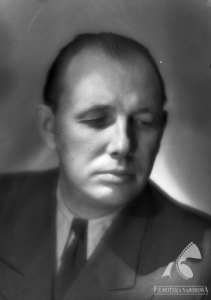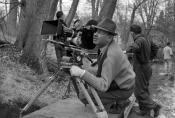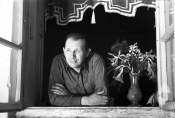Jan Rybkowski

Director, screenwriter, set designer. He was born on April 4, 1912, in Ostrowiec. He graduated from the Department of Interior Design at the School of Decorative Arts in Poznan in 1930, in 1939 from the Department of Set Design at the Faculty of Directing Arts in Warsaw, and in 1949 from the Department of Directing at the State Film School in Łódź. Before the war, he worked as set and costume designer in theatre, later using these skills in cinema. He was an assistant to Józef Lejtes on the set of his film Hania (1939, unfinished). After the war, he worked both in theatre and in film. In 1947, he was assistant to Wanda Jakubowska on the set of Ostatni etap/Last Stage. His own debut came two years later, with Dom na pustkowiu/House in the Wilderness (1949) – an intimate psychological drama based on Iwaszkiewicz’s short story. Later, he directed Warszawska premiera/The Warsaw Premiere (1950) about the first performance of the opera Halka by Stanisław Moniuszko, and in 1955 – Godziny nadziei/Hours of Hope, a neo-realistic story about the last days of the war in a small town.
He employed various genres. He made the satirical Nikodem Dyzma/Nicodemus Dyzma (1956, in 1980 it was made into the TV series Kariera Nikodema Dyzmy/The Career of Nicodemus Dyzma, starring Roman Wilhelmi). In the late 1950s, he gained popularity for his highly successful series of comedies about Mr. Anatol (Kapelusz pana Anatola/Mr. Anatol’s Hat, Pan Anatol szuka miliona/Mr. Anatol Is Looking For A Million, Inspekcja pana Anatola/Inspection of Mr. Anatol), with the great performance of Tadeusz Fijewski in the title role. In 1961, he directed the film Dziś w nocy umrze miasto/Tonight, the City Dies, dedicated to the bombing of Dresden. The themes of war also feature in his Wniebowstąpienie/The Ascension (1968) – based on the story by Adolf Rudnicki. He was also successful as a director of social-psychological films (Pierwsze dni/The First Days, Ostatni strzał/The Last Shot).
He adapted classic works of Polish literature. He made the series (1972) and then the feature film based on Chłopi/The Peasants by Władysław Reymont, the TV series Rodzina Połanieckich/The Polanieckis (1978) and the feature film Marynia (1983) – based on the novel by Henryk Sienkiewicz, and Dulscy/The Dulskis (1975) – the film version of Moralność pani Dulskiej/ Mrs. Dulska’s Morality, and Granica/Boundary (1977) – based on Zofia Nałkowska’s book.
He never actually left the theatre. He developed stage sets in the early 1950s, for example in the Syrena Theatre in Warsaw. He was the head of the “Rytm” Film Studio (1955-1968). He taught at the State Film School in Łódź, where he also served as dean of the Department of Directing from 1974-1977.
In 1954, he was awarded the Order of Polonia Restituta. He received numerous distinctions from the Minister of Culture and Art for his contribution to the arts.
He died on December 29, 1987, in Konstancin near Warsaw.
Selected filmography
-
1955
HOURS OF HOPE












